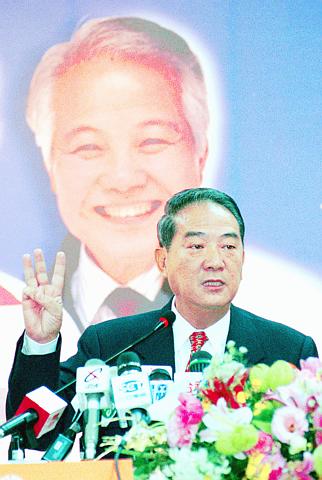In finally unveiling his cross-strait policy yesterday, independent presidential candidate James Soong (宋楚瑜) proposed that Taiwan and China sign a 30-year "mutual non-aggression peace treaty," which would be followed by a 20-year agreement basing relations on a European Union model.
Soong's running mate, Chang Chao-hsiung (
But political analysts said such a scheme would never be acceptable to China as it would entail recognizing Taiwan as an equal.

PHOTO: GEORGE TSORNG, TAIPEI TIMES
Soong also proposed that cross-strait relations be based on a "quasi-international relationship under relevant sovereignty (
Using such a definition, Soong called for both sides of the Taiwan Strait to sign a non-aggression pact, countries such as the US, Japan and ASEAN members.
When the 30-year agreement expires, both parties -- if they are not interested in changing the status quo -- should sign another 20-year agreement defining their relations based on the model of the European Union and in the status of sovereign nations, Soong said.
After that, he said, the people of Taiwan should determine whether to continue the process of integration.
When asked under what status Taiwan should sign the proposed 30-year non-aggression treaty with China, Chang replied: "Under the status of a nation. Signatories should be under the names of the Republic of China and the People's Republic of China."
This would never be palatable to China, according to political analysts.
"The real question here is China's attitude," said Joseph Wu (
Other scholars agreed.
"I'm afraid Beijing is not going to accept such a proposal. It's still a stalemate," said Hsu Szu-chien (
Hsu was equally scathing of Soong's rivals, however.
"None of these irresponsible presidential candidates has so far put forward any feasible proposal for dealing with the problem of cross-strait relations," Hsu said. "Candidates have to face the fact that there is a crisis, and they should be creative in devising ways to deal with it. The key is to involve the US and other Western countries, to use international frameworks such as the WTO, and forces for reform inside China."
Soong also took the occasion yesterday to rebut criticism from his opponents that he had been vague in his China policy.
"I am not ambiguous. I am neither for hasty unification nor for hasty independence, both of which are not mainstream ideas in Taiwan," Soong said. "My cross-strait policy is unambiguously aligned with mainstream public opinion in Taiwan."
While candidates try to pick holes in their rivals' China policies and to promote their own as somehow different, analysts said that all three of the main candidates' positions are virtually the same.
"In essence, all three are no different in their China policy," Wu said. "But this is good. It shows that people in Taiwan have built a strong consensus on the issue."
See Also:
Editorial

AGING: As of last month, people aged 65 or older accounted for 20.06 percent of the total population and the number of couples who got married fell by 18,685 from 2024 Taiwan has surpassed South Korea as the country least willing to have children, with an annual crude birthrate of 4.62 per 1,000 people, Ministry of the Interior data showed yesterday. The nation was previously ranked the second-lowest country in terms of total fertility rate, or the average number of children a woman has in her lifetime. However, South Korea’s fertility rate began to recover from 2023, with total fertility rate rising from 0.72 and estimated to reach 0.82 to 0.85 by last year, and the crude birthrate projected at 6.7 per 1,000 people. Japan’s crude birthrate was projected to fall below six,

Conflict with Taiwan could leave China with “massive economic disruption, catastrophic military losses, significant social unrest, and devastating sanctions,” a US think tank said in a report released on Monday. The German Marshall Fund released a report titled If China Attacks Taiwan: The Consequences for China of “Minor Conflict” and “Major War” Scenarios. The report details the “massive” economic, military, social and international costs to China in the event of a minor conflict or major war with Taiwan, estimating that the Chinese People’s Liberation Army (PLA) could sustain losses of more than half of its active-duty ground forces, including 100,000 troops. Understanding Chinese

US President Donald Trump in an interview with the New York Times published on Thursday said that “it’s up to” Chinese President Xi Jinping (習近平) what China does on Taiwan, but that he would be “very unhappy” with a change in the “status quo.” “He [Xi] considers it to be a part of China, and that’s up to him what he’s going to be doing, but I’ve expressed to him that I would be very unhappy if he did that, and I don’t think he’ll do that. I hope he doesn’t do that,” Trump said. Trump made the comments in the context

SELF-DEFENSE: Tokyo has accelerated its spending goal and its defense minister said the nation needs to discuss whether it should develop nuclear-powered submarines China is ramping up objections to what it sees as Japan’s desire to acquire nuclear weapons, despite Tokyo’s longstanding renunciation of such arms, deepening another fissure in the two neighbors’ increasingly tense ties. In what appears to be a concerted effort, China’s foreign and defense ministries issued statements on Thursday condemning alleged remilitarism efforts by Tokyo. The remarks came as two of the country’s top think tanks jointly issued a 29-page report framing actions by “right-wing forces” in Japan as posing a “serious threat” to world peace. While that report did not define “right-wing forces,” the Chinese Ministry of Foreign Affairs was